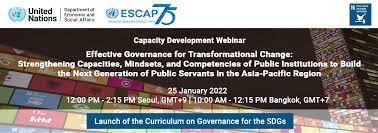
Effective Governance for Transformational Change:
Strengthening capacities, mindsets, and competencies of public institutions to build the next generation of public servants
in the Asia-Pacific Region
Launch of the
Curriculum on Governance for the Sustainable Development Goals (SDGs)
in the Asia-Pacific region
Organized by the
United Nations Department of Economic and Social Affairs (UN DESA)
Division for Public Institutions and Digital Government (DPIDG)
and
United Nations Economic and Social Commission for Asia and the Pacific (UN ESCAP)
25 January 2022
12:00 PM - 14:15 PM Seoul (GMT+9)
10:00 AM -12:15 PM Bangkok (GMT+7)
22:00 PM (-1) – 00:15 AM New York (GMT-5)
Via Zoom
(Registration: https://t.ly/r8Sa)
&
Facebook Live
The United Nations Department of Economic and Social Affairs (UN DESA), through its Division for Public Institutions and Digital Government (DPIDG), in collaboration with the United Nations Economic and Social Commission for Asia and the Pacific (UN ESCAP), is organizing a regional capacity development webinar to launch the Curriculum on Governance for the Sustainable Development Goals (SDGs) (the “Curriculum”) in the Asia-Pacific region. The Offices of UN Resident Coordinators in the region will be invited to provide advice in contextualizing the training material to the national level context.
The Curriculum, developed by UN DESA, will be launched through regional events in cooperation with the regional commissions, the UN Resident Coordinator system, and relevant partners.
Objectives
The Webinar aims to:
- Enhance a common understanding of the capacity gaps and opportunities in governance and public administration in the Asia-Pacific region;
- Raise awareness of the 11 Principles of Effective Governance for Sustainable Development, the Curriculum and the Competency Framework for the SDGs developed by UN DESA;
- Share experiences from the piloting of the Curriculum; and
- Discuss with Webinar participants how to mainstream the Curriculum and the Competency Framework in the curricula of their national training offerings.
Thematic Focus
The 2030 Agenda for Sustainable Development recognizes the need to build peaceful, just and inclusive societies that provide equal access to justice and that are based on respect for human rights, effective rule of law and good governance at all levels and transparent, effective and accountable institutions, in line with Goal 16. Indeed, institutions play a critical role in the achievement of all the SDGs and targets. However, the COVID-19 pandemic has strongly disrupted the implementation of the SDGs and the regular functioning of (public) institutions and affected key government functions and processes, undermining the effectiveness of government action.
The pandemic has exacerbated institutional vulnerabilities and public sector reforms continue to be a major and vexing challenge in many countries. To recover after the pandemic, react quickly to multiple challenges and implement the SDGs, a transformative public service that promotes experimental problem solving and inclusiveness, develops policies that are coherent and evidence-based, and engages own staff, the private sector, academia, and citizens - is critical. The 11 Principles of Effective Governance for Sustainable Development, developed by the UN Committee of Experts on Public Administration (CEPA) and endorsed in 2018 by the Economic and Social Council, provide practical, expert guidance to interested countries in a broad range of governance challenges associated with implementation of the 2030 Agenda.
The Curriculum, which is a holistic and integrated framework, translates the 11 Principles of Effective Governance into practice through capacity development training material on governance and public institutions. It aims to promote critical understanding of sustainable development issues, enhance governance capacity, and strengthen public servants' awareness of their active role in contributing to the achievement of the SDGs. The Curriculum is a comprehensive set of Training of Trainers Capacity Development Toolkits, which contain ready-to-use and customizable training material on key governance dimensions needed to advance the implementation of the SDGs.
The Curriculum provides methodologies and approaches to advance knowledge and assist governments in developing capacities at the individual, organizational, and institutional/societal levels to drive the transformational change to implement the 2030 Agenda. The Training of Trainers Capacity Development Toolkits are structured around modules that include readings, self-assessment situation analysis, application of theories to concrete issues and challenges, priority setting exercises, through case studies, action planning, and other activities that can assist countries in advancing governance transformation for sustainable development. The Curriculum’s Toolkits are made available at no cost on the UNPAN website at unpan.un.org. They are mainly intended for schools of public administration and institutes of public management given their strategic role in training public servants and improving the quality and effectiveness of public policy and service delivery design, implementation, and evaluation through in-service training and education of all those engaged in public service.










Add new comment